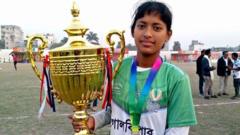As Islamist groups gain influence in Bangladesh, young female athletes like Asha Roy face the cancellation of sports events due to protests against their participation in football, highlighting a broader struggle for women's rights and safety in a changing political landscape.
Bangladesh's Young Female Athletes Face Islamist Opposition Amid Political Transition

Bangladesh's Young Female Athletes Face Islamist Opposition Amid Political Transition
The rise of Islamist groups in Bangladesh poses significant challenges for young female soccer players, leading to canceled matches and safety concerns.
In northern Bangladesh, young female football players are encountering unexpected hurdles as Islamist groups protest women's sports events, leading to cancellations. Asha Roy, 17, was eagerly looking forward to a women's football tournament when an Islamist group insisted the match was un-Islamic, prompting local police to cancel the event to maintain safety. "I was frustrated and frightened. We had never faced such a situation before," Ms. Roy recounted.
Recent political upheaval has heightened tensions in the country, as an interim administration grapples with the resurgence of hardline Islamist factions. The dismissal of a regime regarded as authoritarian following widespread protests has emboldened these groups. In less than two weeks, three women's football matches were called off in northern areas, including a violent clash in Dinajpur where four people sustained injuries.
Sport is viewed by many as a conduit for empowerment among Bangladeshi girls, providing an escape from poverty and a pathway to professional opportunities. Some young athletes, like Roy’s teammate, Musammat Tara Moni, refuse to be deterred, declaring a commitment to pursuing their dreams of representing Bangladesh on the international stage.
The protests, described as alarming by some commentators, reveal a growing divide between fundamentalist interpretations of Islam and moderate, secular values that many Bangladeshis hold. Maulana Ashraf Ali, the Islami Andolan Bangladesh leader, argues that female participants should adhere strictly to Islamic principles, advocating for the implementation of Sharia law.
Despite these challenges, the authorities have attempted to mitigate the backlash. They have proposed reorganizing canceled matches in response to public outcry and have initiated investigations into threats against women in sports. Interim government representatives maintain that incidents of radicalism are overstated, pointing to a successful youth festival earlier this year.
However, skepticism remains among scholars and activists, who fear the implications of such disruptions on women's societal roles. "The women of Bangladesh will not stop playing football and will not stop from going to work or doing their things," asserted Samina Luthfa, a sociology professor at Dhaka University.
Moreover, guidelines rolled back by the interim government concerning Islamist organizations and the release of extremists fueled worries about a resurgence of violence against moderates and secular cultural representations. Reports of vandalism at public events and violent protests reflect a complex backlash against perceived threats to traditional Islamic values.
The intersection of gender, politics, and religion is becoming increasingly critical in Bangladesh, as extremist factions express growing hostility toward not only women's sports but varied cultural expressions. Anisur Rahman Jafri from the Sufi Universal Foundation noted a rise in attacks on minority religious sites, heralding concerns about broader societal implications.
While the current situation poses significant risks for female participation in public life, many remain hopeful for a future where women's voices and ambitions can thrive within a secular framework. Activist Shireen Huq expressed vigilance in facing the growing radicalism, asserting a collective commitment to combat oppressive forces in Bangladesh.



















